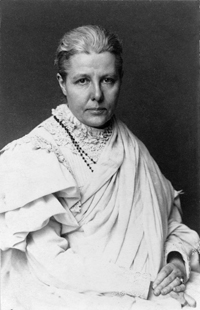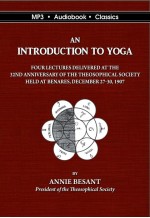Annie Besant
| Annie Besant (1847 – 1933) was a British writer, orator, socialist, theosophist, and activist who published over 300 books and pamphlets during her lifetime. She was an outspoken advocate for causes she thought were right: freedom of thought, secularism, women’s rights, birth control, worker’s rights, Fabian socialism, and home rule for Ireland and India. She was born into an upper middle class British family; her father earned a medical degree from Trinity College in Dublin where he met her mother, an Irish Catholic. At age 20 she married Frank Besant, an Anglican clergyman with whom she had two children before separating over religious differences. She soon became involved with union activities, including bloody Sunday and the London match girls strike, and achieved notoriety as a leading speaker for the Fabian society and the Marxist social democratic Federation. She was a companion of Charles Bradlaugh, with whom she published a book on birth control, arousing controversy that led to a court trial. In 1890, she met noted theosophist Helena Blavatsky and developed an abiding interest in modern theological matters. She traveled to India in 1898 to help establish the Central Hindu College. She made her home in India, speaking and writing on Theosophy as well as women’s rights and social reform. In 1902 she established the first of many international Lodges of the International Order of Co-Freemasonry, Le Droit Humain. In 1907 she became president of the Theosophical Society, headquartered in Madras. She joined the Indian National Congress and was elected its president in 1917. She lectured on Theosophy and campaigned for Indian home rule until her death in 1933. |
An Introduction to Yoga
ForewordThese lectures are intended to give an outline of Yoga, in order to prepare the student to t..
$9.99


